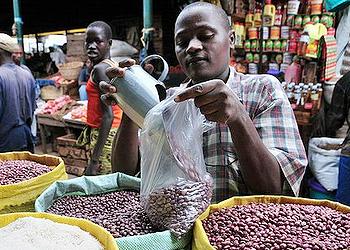
KAMPALA, Uganda, November 12, 2012 (ENS) – The High Court of Uganda has determined that “the rampant and uncontrolled use of polythene bags” poses a danger to the environment and “violates the rights of citizens of Uganda to a clean and healthy environment.”
In a case brought before the court by the nongovernmental group Greenwatch in 2002, Judge Eldad Mwangusya ruled in October that plastic bags are a danger to the citizens of Uganda and he urged the government to pass a law against them “as a matter of urgency.”

“All this court can say,” wrote Judge Mwangusya, is that whoever is involved in the process of enacting a law towards protection of the environment should do so as a matter of urgency because the damage is likely to be extremely costly.”
“In view of this observation the best this court can do is make a declaration that the manufacture, distribution, use, sale, sell disposal of plastic bags, plastic containers, plastic food wrappers, and all other forms of plastic commonly referred to as ‘kaveera’ violates the rights of citizens of Uganda to a clean and healthy environment as acknowledged by both parties,” wrote the judge.
Five years after the Greenwatch lawsuit was filed before the court, the government, through its budget speech in June 2007, did ban the importation, use and distribution of polythene bags of less than 30 microns, but Parliament never passed a law implementing the ban.
After the government’s pronouncement in the budget speech, Greenwatch held nationwide consultations and carried out research to determine the effect of the government’s declaration.
Greenwatch investigators found that the ban had no effect whatsoever on the use, distribution, manufacture or disposal of plastic bags. On the contrary, Greenwatch found that manufacturers had increased the thickness of the polythene bags to 30 or 31 microns and continued to manufacture, use and distribute them.
In its case before the High Court, Greenwatch sought a declaration that the manufacture, distribution, use, disposal of plastic containers, plastic food wrappers, all other form of plastic, commonly known and referred to as “kaveera,” violates the rights of citizens of Uganda to a clean and healthy environment.
The nonprofit group wanted a court order banning the manufacture, use, distribution and sale of plastic bags and plastic containers of less than 100 microns and an order directing the National Environment Management Authority to issue regulations for the proper use, recycling and re-use of all other plastics.
Greenwatch further sought a court order directing the government to restore the environment to the state it was in before plastic pollution.
And finally, Greenwatch sought an order directing the importers, manufacturers, distributors of plastics to pay for the costs of the environmental restoration.
Before the court, Malinga Godfrey, a state attorney in the Attorney General’s Chambers swore affidavits in opposition to Greenwatch’s application for a court order mandating the ban.
Yet, in his ruling, Judge Mwangusya cited statements of Malinga and other government attorneys recognizing the dangers posed by plastic bags.
“From the affidavit of Mr. Malinga it is also very clear that in recognition of the danger to the environment some steps have been taken to curb the importation and use of polythene bags,” wrote the judge.

“The measure[s] included the drafting of a bill that would go a long way in protecting the environment against degradation but what could not be ascertained is how far this process has gone given the length of time this application has been pending in court,” he wrote.
“The rest of the orders prayed for including the ban on manufacturing, use, distribution and sell [sic], regulations for proper use and disposal of all plastics, an environment restoration order and an order directing the importers, manufacturers, distributors to pay costs of environment restoration will hopefully be addressed in the proposed law which as I have already observed needs expeditious consideration in order to protect the environment for the benefit of every citizen both in the short and long time. I order accordingly,” ruled Judge Mwangusya.
There is support for a ban in the Ugandan Parliament. In August 2011, MPs on the Natural Resources Committee threatened to withhold funding for the Ministry of Water and Environment unless it implemented the ban on polythene bags.
Noting with concern the damage the continued use of plastic bags is causing the environment, MP Grace Isingoma Byarugaba said, “This is the time to put our feet down. If the ban on kaveera is not implemented, we should not pass the budget of the line ministry,” reported the “New Vision Uganda” newspaper.
Environmental Law Alliance Worldwide, an international group of lawyers based in Eugene, Oregon, was instrumental in helping Greenwatch obtain this court ruling. Judge Mwangusya mentioned the group favorably in the reasons he gave for his ruling.
“Most of the scientific information contained in the pleadings to substantiate the arguments was obtained from ELAW,” said Greenwatch attorney Kenneth Kakuru, an ELAW partner in Kampala.
“This is a major milestone in the environment landscape in Uganda considering the menace that polythene bags have caused over time,” said Kakuru. “Scientific information from ELAW and judgments from other jurisdictions where ELAW partners operate have continuously been of great help to Greenwatch winning major court battles in Uganda.”
Copyright Environment News Service (ENS) 2012. All rights reserved.
© 2012, Environment News Service. All rights reserved. Content may be quoted only with proper attribution and a direct link to the original article. Full reproduction is prohibited.
